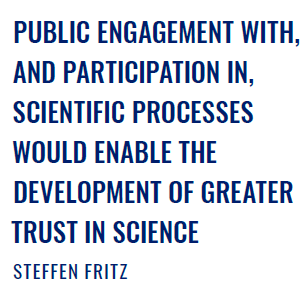
Options Magazine, Winter 2022: Science-informed policy is crucial to solving the interconnected and complex global to local problems society faces today. There is, however, one essential element that is critical to the success of such an ambitious endeavor: trust in the scientific information provided.
While trust is the cornerstone of many relationships, it is essential for societal acceptance of scientific advice. If people do not trust scientific information or advice, it hampers the contributions of science at best, and sidelines them at worst. Scientists and societies need to work closer together to ensure that these times of uncertainty and upheaval lead to a new era of agreeable solutions that enrich the lives and wellbeing of everyone. Engaging diverse communities throughout the scientific process with an emphasis on also hearing all, especially those that were historically marginalized, is an important step in earning and building a trustbased relationship.
IIASA has taken a leading role as a trust builder since its founding in 1972. In fact, one of the institute’s founding principles is to promote science diplomacy and foster debate and collaboration to support diplomatic efforts and peace building between communities. The IIASA Strategy 2021–2030 reinforces that ambition, stating that “IIASA builds trust and helps divergent views jointly confront problems of global interest”.
ENHANCING INTERACTIONS WITH SOCIETY
In 2020, a partnership between IIASA and the International Science Council (ISC) drew on the combined strengths and expertise of the two organizations to define and design sustainability pathways that would enable reconstructing a more sustainable post COVID-19 world. One of the topics investigated was how science systems could be strengthened to be better prepared to deal with future global crises.
Among the recommendations from that work was that it is important to enhance communication of scientific knowledge, along with public understanding and trust in science, and to improve the quality and efficacy of the science–policy interface by, for example, increasing the transparency of science input into policy through engagement with different stakeholder groups.
“Trust in science and its possible erosion have been long discussed. One of the key lessons from the pandemic is that a policy can be rendered more or less effective depending on the degree of trust that the public has in the scientific messaging it receives and in the government’s responses,” explains IIASA Advancing Systems Analysis Program Director Elena Rovenskaya.
Building on the lessons learnt from the IIASA-ISC initiative, IIASA launched the Transformations within Reach Project early in 2022 to continue the development of feasible, science-based recommendations to catalyze sustainability transformations.
As part of this project, researchers aim to identify how the way society makes decisions needs to improve to activate and facilitate a transformation towards sustainability. As a first step, the initiative has called on experts, citizens, and anyone with an interest in sustainability issues, to provide their inputs to enrich the recommendations of the initiative. The goal is to propose levers of societal change that trigger systemic transformations in societal decision-making systems, which could radically improve both the resilience of our societies to sustainability threats, but also its agility to adapt to new opportunities and needs.
 © IIASA
© IIASA
TOOLS FOR TRUSTWORTHY SCIENCE
Recognizing that trust in science can be earned and needs to be maintained, a novel IIASA strategic research initiative aims to develop a toolkit for participationdriven scientific approaches, including citizen science and participatory decision making, and to explore how such approaches can enable building increased trust in science and boost its societal impact.
The vision driving the activities of the aptly named TRUST Strategic Initiative – an acronym for “Tools for Raising and Understanding trust in Systems science through citizen engagemenT – is that fostering and growing public trust and participation in science will contribute to a broader acceptance of scientific guidance and proposals for societal progress.
“According to the 2021 Eurobarometer on Europeans’ knowledge and attitudes towards science and technology, less than a quarter of the European respondents reported feeling well informed on scientific and technological issues and half of them reported a loss of trust in science,” explains IIASA Strategic Initiatives Program Director Steffen Fritz. “We argue that public engagement with, and participation in, scientific processes would enable the development of greater trust in science, while also offering opportunities for the public to engage directly with scientific information and develop their own views on the credibility of scientific information and the trustworthiness of the scientific process.”
This vision underpins the mission of TRUST, to create the conditions for enhanced trust in science advice. As part of the initiative, the research team will develop a network for knowledge exchange around participation-driven science and monitor its effects on enhancing trust in science, while also promoting access to participation-driven science and tools.
“Trust in science is crucial when it comes to delivering societal impact through scientific findings and results, but it is important to remember that this is not a given. Scientists and scientific organizations like IIASA need to actively engage with one another, as well as with the public and decision makers. We need to listen to one another’s insights, reflect on underlying attitudes and findings, and foster public support for the work we do,” notes Teresa Deubelli-Hwang, who co-leads the TRUST initiative together with Jung Hee Hyun.
By exploring participation-driven science tools and approaches, and their relationships with building trust in science, the TRUST initiative responds directly to an identified need shared by science communities everywhere, but also the IIASA national and regional member organizations. The project also contributes toward solidifying the institute’s strategic goal of promoting the use of participatory processes to ensure societal and policy relevant research.
THE BATTLE AGAINST MISINFORMATION
Many people rely on social media platforms as a source of information due to the quick and easily understandable and digestible news updates they provide, and the ability to readily share this with family and friends. Unfortunately, these channels also contribute greatly to the spread of misinformation, which challenges and undermines global trust in science and influence people’s responses to policy proposals and interventions. During the pandemic, for example, misinformation spread through these channels influenced people’s behavior and resulted in resistance to public health measures to limit the spread of COVID-19, a situation that was ultimately detrimental to our collective public health.
The EU-funded Co-Inform Project has been running since 2018 and deals with the phenomena of misinformation and its impact on decision-making processes by studying the rapid dissemination of misinformation. The project involves different groups of stakeholders including citizens, journalists, and policymakers to promote the development of sociotechnical solutions to understand the phenomenon of misinformation and its impacts, as well as to increase the resilience of society to misinformation.
As part of the project, researchers are co-developing a browser plugin to raise awareness of fully or partially misinforming content, related fact-checking articles and corrective information, the perceptions of average citizens towards particular content, and of key pro- and against comments from fellow users. In addition, the team is working on a dashboard for fact-checking journalists and policymakers, showing the misinformation detected, where it originates from, how and where it spreads and will spread in the near future, what the current and predictable public perceptions are likely to be, and also relevant comments from the public.
“I continue to be amazed by the variety of people participating in Co-Inform. We come from different countries, as well as different cultural and career backgrounds, all bringing unique views and perceptions to the project. We are, however, united by a common goal, namely, the need to understand the spread of misinformation and to build trust in science using artificial intelligence tools to deal with misinformation as a crucial step on the way to making informed decisions that will help society move towards sustainability,” says Nadejda Komendantova, who leads the Cooperation and Transformative Governance Research Group at IIASA.
SCIENCE DIPLOMACY AND COLLABORATION AS A CATALYST FOR TRUST
To further support and contribute to the aims and objectives of building trust in science, earlier this year IIASA became a full member of the EU Science Diplomacy Alliance, a collaborative initiative launched under the auspices of several Horizon 2020 science diplomacy projects. In addition, IIASA was the driving force behind the Vienna Statement on Science Diplomacy, a document in which signatories commit to uphold the principles of science diplomacy and emphasize the benefits it can bring to tackling the challenges of our time. To date, over 200 high-level officials from governments, academia, and others in the science diplomacy community have heeded the call to endorse and support the ideals of the statement.
In the coming years, IIASA will continue to inform policy with the best of science: enabling decision-makers to balance human needs with those of a sustainable environment and economy, as well as more resilient societies. This goal will be supported by further strengthening the institute’s collaboration with the broader scientific community and civil society as a whole.
“Shared global challenges will not be resolved unilaterally, and no nation will achieve a sustainable future in isolation. We look forward to building new relationships and forging strong collaborative ties with our partners around the world to bring our collective expertise to bear on the many challenges society faces today,” concludes IIASA Director General Albert van Jaarsveld.
by Ansa Heyl
 © Adam Islaam | IIASA + Inkoly | Dreamstime
© Adam Islaam | IIASA + Inkoly | Dreamstime
Publication
Rovenskaya, E. , Kaplan, D., & Sizov, S. (2021). Transformations within reach: Pathways to a sustainable and resilient world - Strengthening Science Systems. IIASA Report. IIASA-ISC



